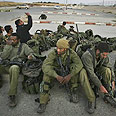
Senior officers slam IDF's lack of resolve in Gaza
Officers serving in Gaza say limitations placed on army by political echelon prevent Israel from effectively fighting terror in Strip. 'Our activity carries no deterrence,' one officer warns
Senior IDF officers serving in Gaza are frustrated over what they describe as the army's lack of resolve and limited action against terror emanating from the Strip.
"This week I returned from another standby shift at the combat helicopter base where I do my reserve duty," lit.-Col. N told Ynet. "Again we did nothing, despite a Qassam and mortar barrage fired by terrorists at the entire sector."
N says that he feels obligated to warn that the IDF is not doing enough to counter terrorism from Gaza.
"The Gaza Strip is a narrow area, almost entirely closed off, the terrorist forces are relatively small and their weapons – although they are improving every day as a result of our lack of action – still don't constitute a significant threat to our forces.

'Rocket attacks prompt frustration' (Photo: AFP)
"But the most important factor is that Gaza is ruled by a powerful centralist regime that controls the Qassam attacks on Israel. This regime is in complete accord with the terror groups – and this enables us to effectively pressure the government."
'Home front criminally neglected'
Many other officers share N's views and feel that a lot more could be done if only the political echelon gave the army more leeway. "Our activity carries no deterrence, and the enemy understands he can launch rockets non-stop without suffering a response," an officer familiar with the area said.
One of the officers pointed to the fact that the IDF's operations are mainly defensive in nature. "We don't initiate enough, and this hurts us. Every Qassam that lands in Israel prompts frustration among the soldiers," he stressed.
Another officer compared the events in Gaza to the failures of the Second Lebanon War. "In both cases we're afraid to reenter the territory so that our escape – the unilateral pullout – would not be perceived as a failure. In both cases there is ongoing hesitation and no clear strategic decision.
"In both cases the home front is being criminally neglected and in both cases, the longer we wait the steeper the price we will have to pay."










